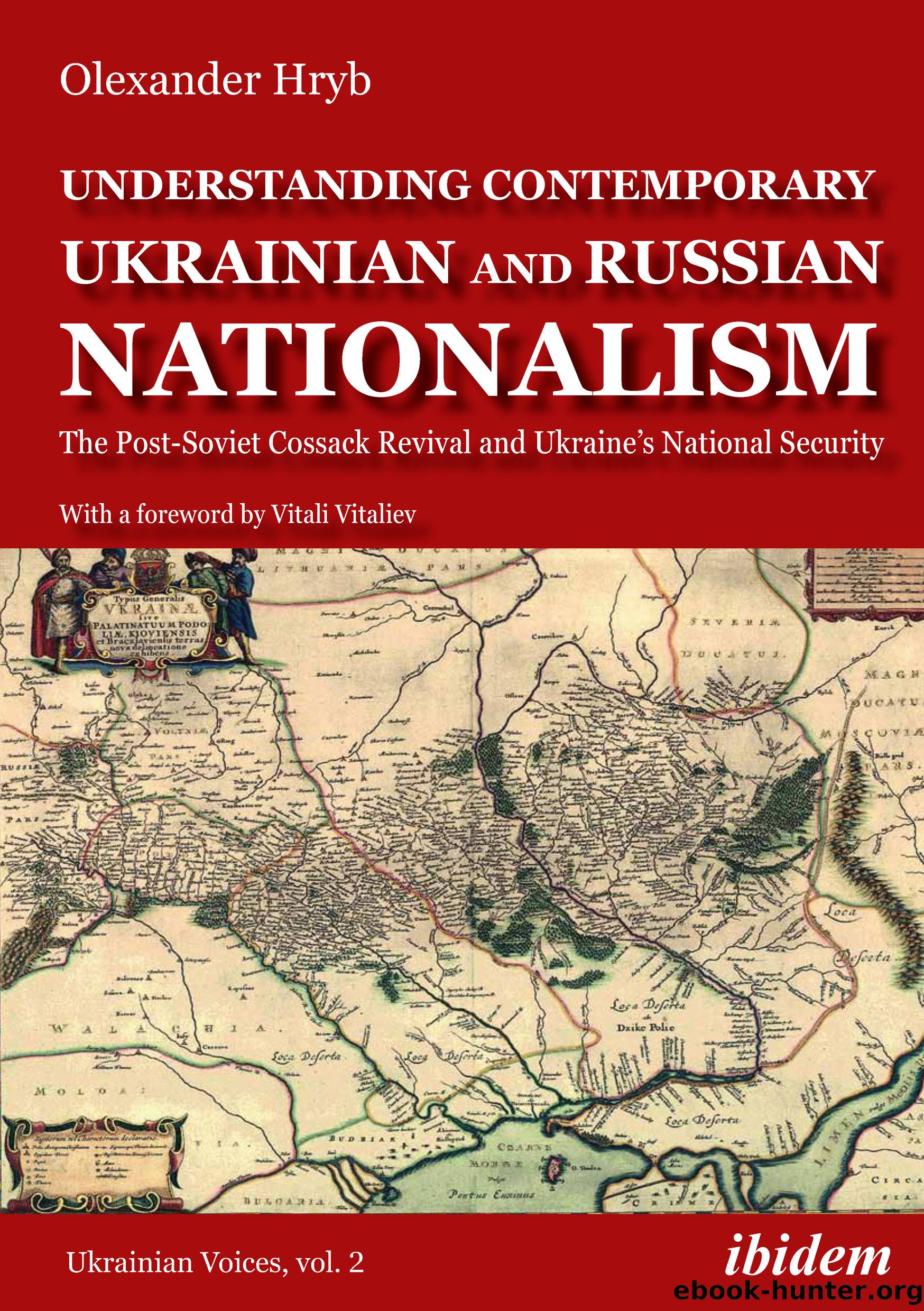Understanding Contemporary Ukrainian and Russian Nationalism by Olexander Hryb

Author:Olexander Hryb [Olexander, Hryb,]
Language: eng
Format: epub
Tags: tudiesiesStudiesS
Publisher: Ibidem Press
Published: 2020-03-19T16:00:00+00:00
4.4. The Heritage of Soviet Ethnography and Ethno-Geopolitical Discourse in Ukraine
Independent since 1991, Ukraine, unlike the Russian Federation, is a unitary state. Thus, it proclaimed a similar policy of building a “political nation,” something reflected in official terminology and political discourse. After gaining independence in August 1991, Ukraine issued a “Declaration of Nationalities’ Rights,” which offers the first definition of the Ukrainian nation. The term “people of Ukraine” was used to include over one hundred ethnically defined nationalities, together with the “‘Ukrainian narod (ethnic Ukrainian people).” Initially, the term “Ukrainian people” was understood as the Ukrainian nation or Ukrainian “titular” ethno-nation, while the term “people of Ukraine” referred to a multi-ethnic political nation.
This formulation evoked protests from Ukrainian nationalists, who saw the term “people of Ukraine” as diminishing the status of Ukrainians in the newly established state to merely one of many “ethnic groups” among the “people of Ukraine.” However, a new Ukrainian constitution, approved by the Ukrainian parliament in 1996 on behalf of “the Ukrainian people,” explained that the term referred to “citizens of Ukraine of all nationalities.”
While the difference between the two terms might seem insignificant, it reflects a change toward a more ambiguous Ukrainian nationalities policy, one which persisted throughout the late 1990s and into the new century. An example of this ambiguity is the reference in the constitution to the choice of self-determination made by the “Ukrainian nation,” which was followed by “the Ukrainian people,” i.e., specifying in this way that “the Ukrainian people” are a political nation as opposed to “the Ukrainian nation” in the ethnic sense. President Leonid Kuchma mostly used the term “the Ukrainian people” (e.g., Kuchma 1999, 345-346). He considered the creation of a political, i.e. a civic, nation, as along with liberal democracy and civil society as one of the greatest achievements of Ukraine since independence (Kuchma 1999, 3).
The heritage of Soviet Ethnography and Soviet nationality policy is directly reflected in several articles of the Ukrainian constitution, which deal with the rights of national minorities and indigenous peoples. Article 11 proclaims that “the State promotes the consolidation and development of the Ukrainian nation, of its historical identity, traditions and culture, and also the development of ethnic, cultural, linguistic and religious identity of all indigenous peoples and national minorities of Ukraine.”11 Neither the constitution nor other laws of Ukraine provide sufficient explanation as to which people in Ukraine are considered to be indigenous, apart from the Ukrainians when considered in an ethnic sense, i.e., the Ukrainian nation as in Article 11. Ukrainian scholars did not clarify this issue either and the “Short Encyclopedia of Ethno-State-Science” referred only to Ukrainians as an “indigenous” nationality in Ukraine. Other nationalities are usually referred to by scholars, as well as by Ukrainian law, as national minorities. The only exception is the reference to the Crimean Tatars as indigenous people of Crimea, made by Verkovna Rada in 2014, inadvertently accepting that ethnic Russians were newcomers to the peninsula (since 1789) (Quote from https://www.radiosvoboda.org/a/29426321.html).
National identity was generally understood
Download
This site does not store any files on its server. We only index and link to content provided by other sites. Please contact the content providers to delete copyright contents if any and email us, we'll remove relevant links or contents immediately.
| Arms Control | Diplomacy |
| Security | Trades & Tariffs |
| Treaties | African |
| Asian | Australian & Oceanian |
| Canadian | Caribbean & Latin American |
| European | Middle Eastern |
| Russian & Former Soviet Union |
The Secret History by Donna Tartt(19058)
The Social Justice Warrior Handbook by Lisa De Pasquale(12187)
Thirteen Reasons Why by Jay Asher(8894)
This Is How You Lose Her by Junot Diaz(6877)
Weapons of Math Destruction by Cathy O'Neil(6267)
Zero to One by Peter Thiel(5789)
Beartown by Fredrik Backman(5737)
The Myth of the Strong Leader by Archie Brown(5500)
The Fire Next Time by James Baldwin(5432)
How Democracies Die by Steven Levitsky & Daniel Ziblatt(5216)
Promise Me, Dad by Joe Biden(5144)
Stone's Rules by Roger Stone(5081)
A Higher Loyalty: Truth, Lies, and Leadership by James Comey(4954)
100 Deadly Skills by Clint Emerson(4921)
Rise and Kill First by Ronen Bergman(4780)
Secrecy World by Jake Bernstein(4742)
The David Icke Guide to the Global Conspiracy (and how to end it) by David Icke(4709)
The Farm by Tom Rob Smith(4502)
The Doomsday Machine by Daniel Ellsberg(4485)
